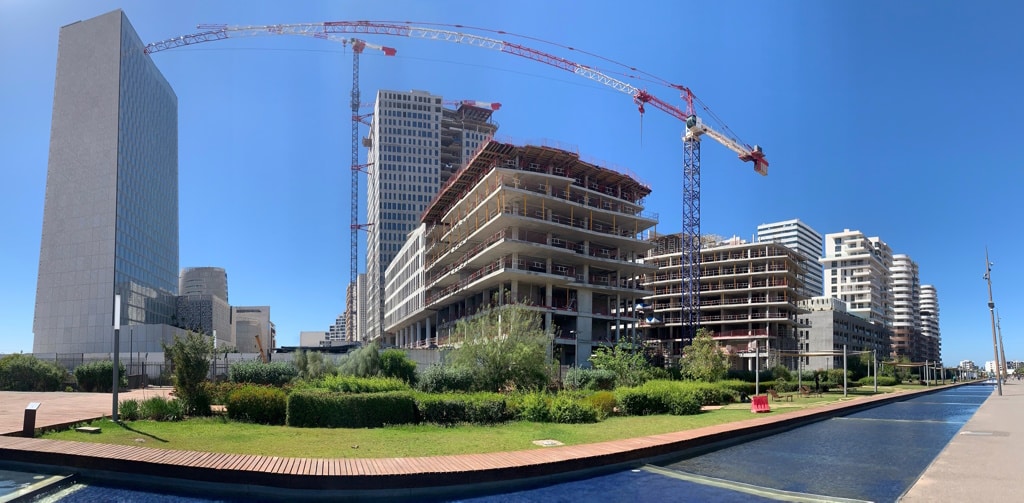Transport infrastructure constraints, the absence of regulatory frameworks, the limited availability of financing and sometimes the high initial costs of certain projects are notorious obstacles to green growth, particularly in Algeria, Tunisia and Egypt. These obstacles are highlighted in the report “North African Economic Outlook 2023”. The 156 pages of this document, recently published by the African Development Bank (AfDB), also reveal that political instability and security problems in Tripoli have slowed down reforms, particularly in the field of renewable energies.
As a result, Libya’s green growth index has fallen to 29.8 in 2021 from 33.2 in 2010 (out of 100), while Mauritania is currently 11.6 points ahead. These statistics, compiled by the Global Green Growth Institute (GGGI), make the Moroccan authorities the best performers in this area, with a score of 56.4, given the “notable progress” made by the private sector in the Kingdom of Morocco in terms of climate investments, according to the AfDB. In addition, the financial institution based in Abidjan, Ivory Coast, notes that environmental, social and governance (ESG) criteria are beginning to be a prerequisite for institutional investors in the sub-region.
Carbon neutrality
By way of illustration, the report mentions the International Finance Corporation (IFC), which subscribed for $100 million in a green bond issued by the Banque Centrale Populaire (BCP) following certification by the Climate Bonds Initiative, whose aim is to ensure compliance with environmental standards. Among the recommendations for North African countries compiled by Eric Kehinde Ogunleye, Amadou Boly and Amah Marie-Aude Ezanin Koffi are the reduction of CO2 emissions generated by the transport sector and the improvement of energy efficiency.
Read also-AFRICA: mobility and decarbonisation, a difficult equation ?
The AfDB’s emphasis on energy transition is based on the fact that North Africa “has the potential to generate more than 1,000 GW of renewable energy by 2030 to meet more than three times the region’s electricity demand, according to the International Energy Agency’s (IEA) 2019 report”. According to the experts, this will be possible provided that priority is given to battery storage technologies and pumped storage systems capable of overcoming the intermittency attributed to solar and wind power.
Climate resilience
But for the group led by Akinwumi Adesina, adaptation to climate change with the support of civil society organisations (CSOs) remains paramount. “Adaptation activities include sustainable and climate-smart agricultural practices, sustainable water and waste management and recycling, green housing, resilient infrastructure and technologies, and efficient irrigation through water conservation (e.g. drip or sprinkler irrigation),” says the report, which is overseen by Kevin C. Urama, AfDB Chief Economist and Vice President.
Biodiversity is not to be outdone in this quest for green growth. The target countries are called upon to find efficient solutions to natural and meteorological phenomena that threaten the health of fauna and flora as well as human survival. This is the case with forest fires, to which Tangiers (Morocco), Kabylie (Algeria) and Jendouba (Tunisia) are becoming accustomed due to record heatwaves. To remedy the situation, the “North African Economic Outlook 2023” report mentions ecosystem governance and planning, early warning systems, as well as conservation agriculture and agroforestry, which could “sequester up to 9.3 gigatonnes of CO2 per year by 2050″, the equivalent of 2 billion cars on the road, according to the World Bank.
The circular economy
There is also the circular economy, which should generate new jobs, especially for young people in the Maghreb, through the proliferation of waste processing and recycling plants, starting with plastic and paper, which contribute to poor air quality, particularly in Egypt. The Serbian platform Numbeo has ranked Cairo as the most polluted city in the second half of 2023.
Read also-AFRICA: Freetown, Casablanca… women at the helm of future green cities
“Governments in North Africa could initiate regular public awareness campaigns on sanitation, using schools and local communities. There is also the implementation of regulations and concrete sanctions to reduce the problem of uncontrolled dumping”, concludes the AfDB.
Benoit-Ivan Wansi
